We get a montage of life onboard the Dawn Treader as it sails eastward set to audio of one of Eustace’s diary entries. Those entries are a great source of humor in the book with the delusional way Eustace presents himself as a perpetual victim and everyone else as a villain. The movie actually makes them even funnier. “Dear diary,” Eustace writes, “there’s been an extraordinary turn of events. I’ve been abducted by my cousins and set adrift in uncharted waters in some ridiculous looking boat.” As Eustace writes that part, he’s seated in his hammock in the morning and Reepicheep’s tail dangles from the hammock above, annoying him. “What’s worse is I share quarters with an obnoxious mouse thing. And I thought bunking with my cousin was bad enough! So far, every person I’ve met in this strange place suffers from the most florid delusions, chasing green mists and looking for lost lords. I can only assume that this is the result of poor diet or they’re all just barking mad.” By now, the scene has changed to daytime and everyone is on deck. Caspian and Drinian are looking at a parchment[1]I’d say a map but they’re supposed to be in uncharted waters., Lucy is mending her clothes, and Edmund is cleaning Bern’s sword. “Cousin Edmund is no exception,” writes Eustace. “He spends every spare second rubbing that tin sword of his like it’s some magic lantern. Poor fool clearly needs a hobby.” Reepicheep however tells Edmund the sword is going to be magnificent and jokingly asks if it comes in a smaller size. “Peeving marmot!” mutters Eustace who is huddled in a corner among some supplies, journaling. “He’s even more deluded than my cousin! In England, we had mousetraps and all that sort of thing.” A seagull lands near Eustace. “Speaking of food, you don’t know where I could get any, do you?” It’s revealed that a couple of sailors are staring at him. “Uh, why are you talking to that bird?” one of them, the minotaur, asks. “Why, I just naturally assumed he could-” The sailors guffaw and one of them, the human, describes Eustace as “mad as a loon” for talking to birds. This isn’t hilarious or anything, but I do appreciate that this movie establishes that not all animals talk in the world of Narnia. Between the Pevensies riding talking horses and automatically assuming a random bear they met could talk, I was wondering how they got meat.
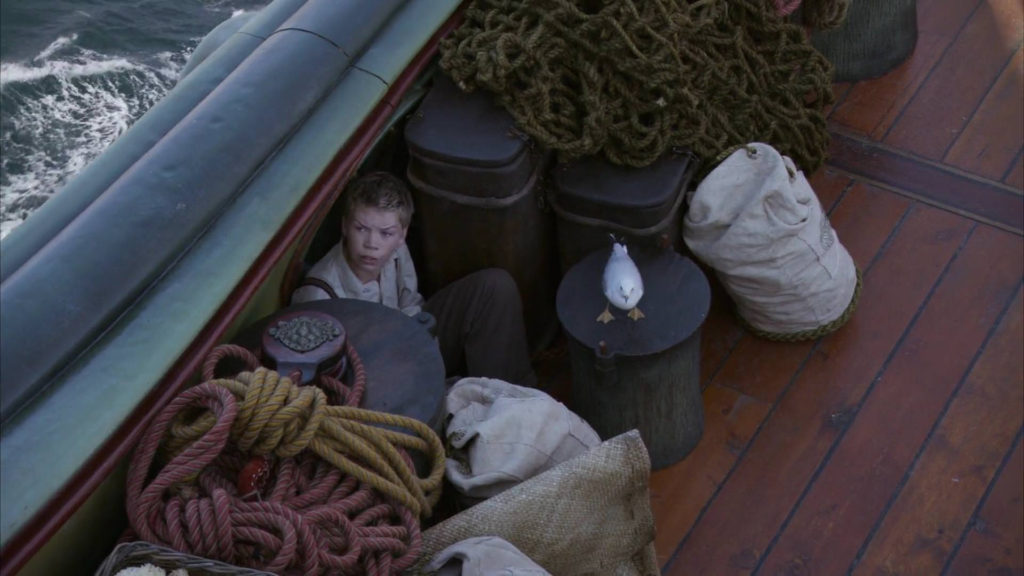
Below deck, a hungry Eustace, after making sure no one is looking, pockets an orange. But he didn’t look hard enough. “Are you aware stealing rations is a capital offense at sea?” demands a voice. It belongs to Reepicheep. After seeing the size of who is confronting him, Eustace clearly intends to ignore him, but Reepicheep won’t be dismissed. “Men have been keelhauled for less!” he insists. “For what?” asks Eustace. “For treason and sneakiness and general nuisancery,” sputters Reepicheep. Do you see what I mean when I describe him as sounding like Bertie Wooster? By the way, in the book, Reepicheep catches Eustace stealing water after the ship has lost most of its water in a terrible storm.[2]There will be a terrible storm later in the movie, but it won’t have nearly as serious consequences as the book’s storm had. Since there hasn’t been any mention of food being short in the movie, Eustace stealing one orange doesn’t really seem that bad. I guess the situation is similar enough in that the crew has no way of knowing when or if the Dawn Treader will reach land and they need to save as much of their rations as possible. But talking about keelhauling and treason still feels like an overreaction on Reepicheep’s part. “Look, just hand over the orange and we’ll let the matter pass,” he says. “I don’t know what you’re talking about,” says Eustace and starts to walk away. “Allow me to clarify,” says Reepicheep, blocking his path or rather begins to say as he’s about to block his path when Eustace grabs him by the tail. “Look,” he says, “I’ve had quite enough of you-” OK, I know I called Eustace one of the best written and best adapted characters in this series as well as the most well-acted, but nothing is perfect, and I do feel like they’re sanitizing him in this scene. In the equivalent moment in the book, Eustace sneaks up on Reepicheep and tries to swing him around by his tail for fun. Just grabbing the tail in anger, while inappropriate, doesn’t seem that mean by comparison.
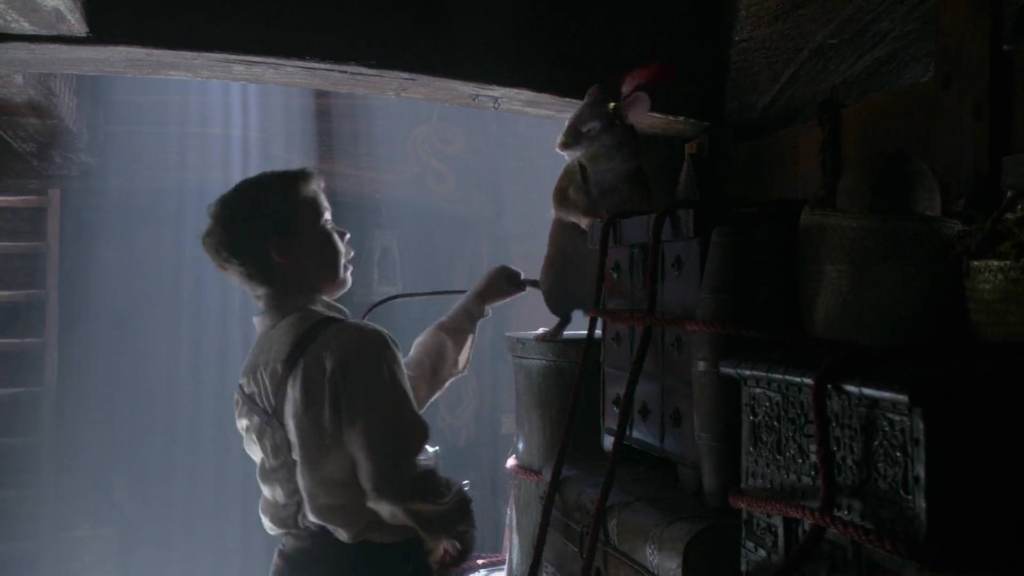
But Reepicheep is certainly appalled by it. “Unhand the tail,” he says in a chilling voice, drawing his sword. “The great Aslan himself gave me this tail. No one, I repeat, no one touches the tail! Period exclamation mark!” I’ve read some fans online object that to sound more British, Reepicheep should have said “full stop exclamation mark” instead of “period exclamation mark.”[3]At least he didn’t say “exclamation point.” I just think it’s a dumb phrase either way and I’m annoyed that the character of Reepicheep said either version. And who thought “no one touches the tail” sounded better than “a tail is the honor and glory of a mouse?” Anyway, Eustace is intimidated enough to let go of the tail. “Now I will have the orange,” says Reepicheep, “then I will have satisfaction.” He uses his tail to hand Eustace a butcher’s knife so they can duel. “Please! Please! I’m a pacifist!” Eustace protests. He was a pacifist in the book too or his parents are pacificists anyway, so credit goes to the filmmakers for including that. Reepicheep won’t be dissuaded so Eustace runs up on deck. Foolishly, he doesn’t drop the knife, not realizing that Reepicheep would be too honorable to fight him unarmed. Reepicheep swings on a rope in front of Eustace. “Trying to run away? We’re on a boat, you know,” he taunts him. “Please,” says Eustace, “can’t we just discuss this?” Reepicheep cuts a hole in Eustace’s shirt. “That was for stealing,” he says then he spears the orange Eustace was hiding. “That was for lying.” Then he strikes Eustace across the face. “And that was for good measure!” The knife in Eustace’s hand trembles but it’s because he’s now angrier than he is scared. He swipes unsuccessfully at the mouse who jumps out of the way. “That’s the spirit!” he says. “We have ourselves a duel!” He tosses the orange to Drinian whose expression is hilariously resigned.
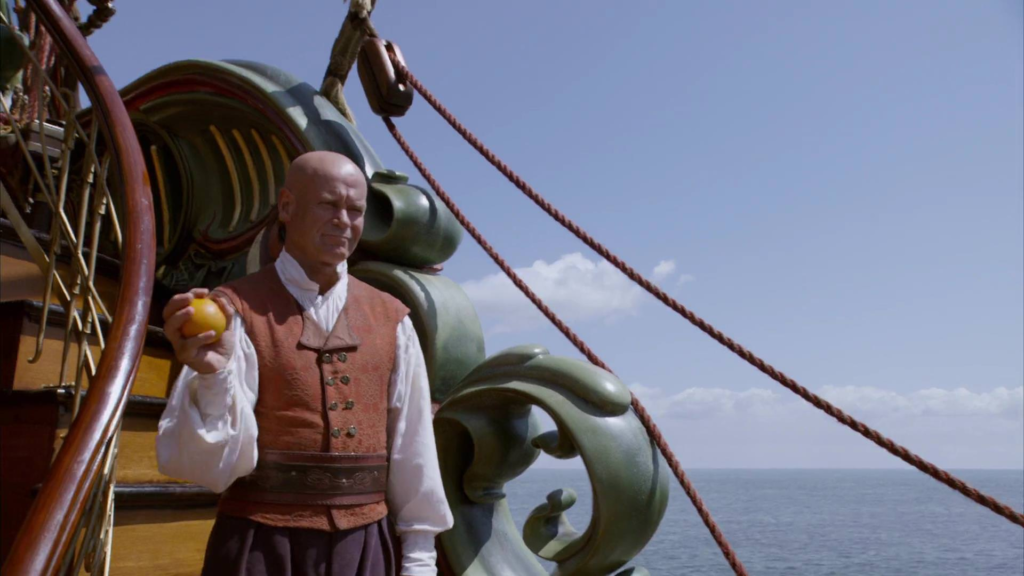
The rest of the crew are happy to see a little boy get beat up by a mouse. I guess they’re really desperate for entertainment. Again, for the most part, I love the writing for Eustace’s character in the movie, but it hasn’t shown him being enough a nuisance for the whole crew’s delight at his humiliation to feel justified. While we’ve heard him complain obnoxiously when he was first brought on board, lately he seems to have been keeping to himself, writing in diary and not bothering anybody.
In the book, when Eustace refuses to give him satisfaction, an angry Reepicheep instead uses his sword as a switch to lay down some corporal punishment. The movie instead has him see potential in Eustace that no one else sees and take this moment to playfully teach him how to swordfight. Since it’s rather cliche to have two characters start out hating each other and then develop a deep bond, I see the appeal of this change to Reepicheep’s character though I feel like him initially hating Eustace made more sense given his personality. From what I’ve heard from the people who love this movie, the relationship between these two characters is one of their favorite things about it and I can understand that. Eustace and Reepicheep are the only characters whom I feel the screenwriters really enjoyed writing and the only ones from the book whom they found a source of inspiration. With Caspian, Edmund and Lucy, there’s a palpable sense that the book gave them no ideas and I can feel them forcing arcs for the characters.[4]This is probably because Eustace was the only character with a major arc in the book. I don’t mean that as a criticism by the way. I don’t believe every book needs to be about character … Continue reading That being said…this scene doesn’t work for me. Partly that’s because of what I wrote above and partly it’s because I don’t like the way Reepicheep is written here. His instructions range from silly (“Stop flapping your wings like a drunken pelican!”) to vague and cliche. (“Be nimble! It’s a dance, boy, a dance!”) In another book by C. S. Lewis, Till We Have Faces, a character teaches the protagonist how to use a sword. I don’t how much research Lewis did but he really creates the impression that what the mentor character says is what an actual instructor would have said in a historical culture where swords were used.
“That shield is too heavy,” he said. “Here’s the one for you. Slip it on, thus. And understand from the outset; your shield is a weapon, not a wall. You’re fighting with it every bit as much as your sword. Watch me, now. You see the way I twist my shield — make it flicker like a butterfly. There’d be arrows and spears and sword points flying off it in every direction if we were in a hot engagement. Now: here’s your sword. No, not like that. You want to grip it firm, but light. It’s not a wild animal that’s trying to run away from you. That’s better. Now, your left foot forward. And don’t look at my face, look at my sword. It isn’t my face is going to fight you. And now, I’ll show you a few guards.”
Why couldn’t Reepicheep have been written like that in this scene?
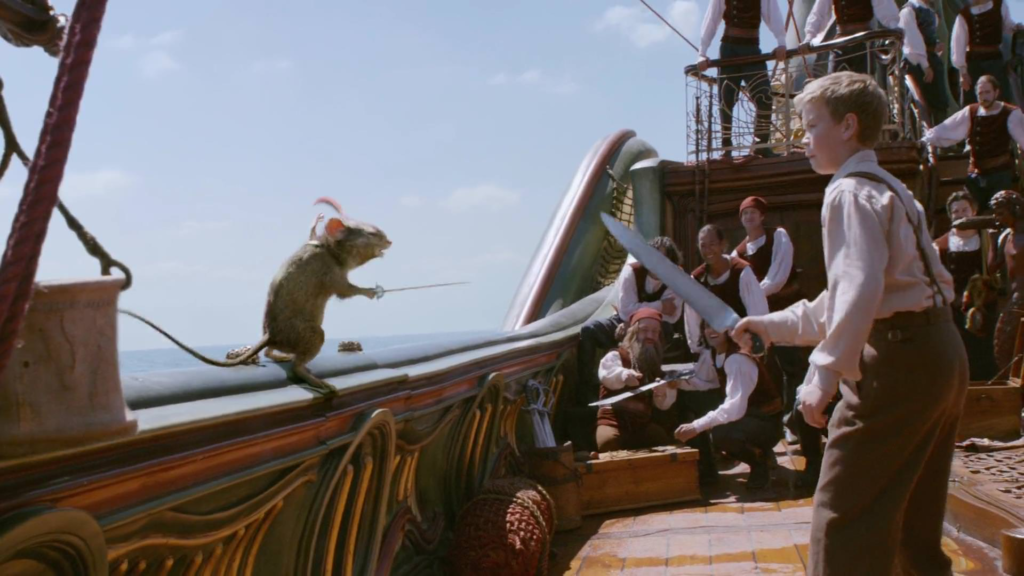
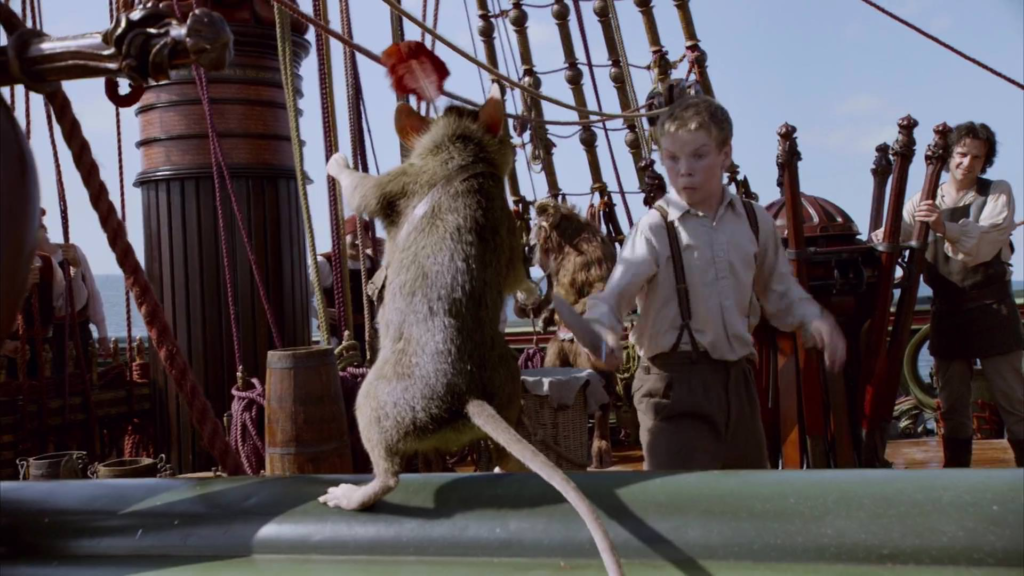
The duel ends with Reepicheep pretending to topple overboard, sneaking up behind Eustace when he peers over the railing, tapping him on the shoulder with his tail and knocking him down when he turns. “And that is that!” Eustace knocks over a basket and someone crawls out of it. It’s the young girl whose mother was devoured by the Mist. “Gael? What are you doing here?” asks her father. I kind of despise the name Gael by the way. For the first two movies, the writers did a good job of inventing names that sound Narnian. Here they just took the name Gail and changed a letter. Same with her mother’s name, Helaine. At least the father’s name, Rhince, is from the book. (He’s the Dawn Treader’s first mate there.) When reports on the filming of the movie first mentioned this character, fans of the book were baffled as to her identity and some in the community took to calling her the MLG or the Mysterious Little Girl, so with the court’s permission, that’s what I’m going to call her. For a moment, it looks like MLG is in big trouble. Then her father, moved by her vulnerability, puts a protective arm around her.
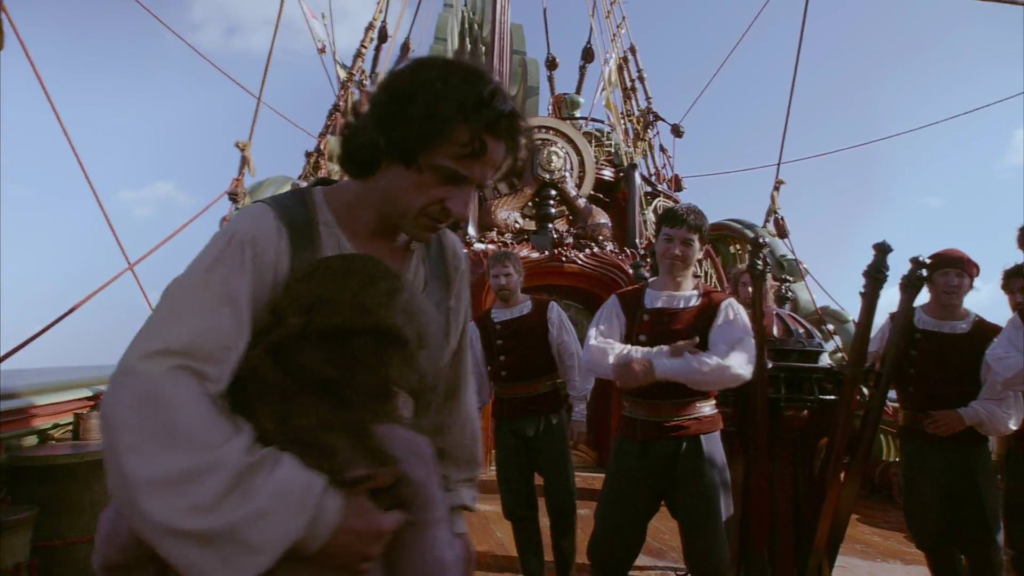
All are silent as a stern looking Drinian approaches. “Looks like we have an extra crew member,” he says. Then he just hands her the orange and walks away. “Welcome aboard,” says Lucy with a smile. “Your Majesty,” says an awed MLG, curtseying. “Call me Lucy,” says the queen and leads her away. So… stealing one orange is a capital offense on the Dawn Treader but stowing away and giving them a whole extra mouth to feed with nothing in return is fine? Maybe the reason Reepicheep stressed the strictness of the rules was to make Drinian’s surprising tolerance as heartwarming as possible. It succeeds decently enough but it could have been a lot better. I feel that’s largely because of the casting. Not that any of the actors in this little moment give bad performances per se. But in the first two movies, every actor, even those in supporting roles, made a big impression. Hardly anyone in this film does. Just compare moments like Mrs. Pevensie bidding her children farewell, possibly for the last time, in The Lion, the Witch and the Wardrobe (2005) or Glenstorm’s wife realizing that one of her sons is dead or imprisoned, mostly like the former, in Prince Caspian (2008) to this. There’s no comparison.
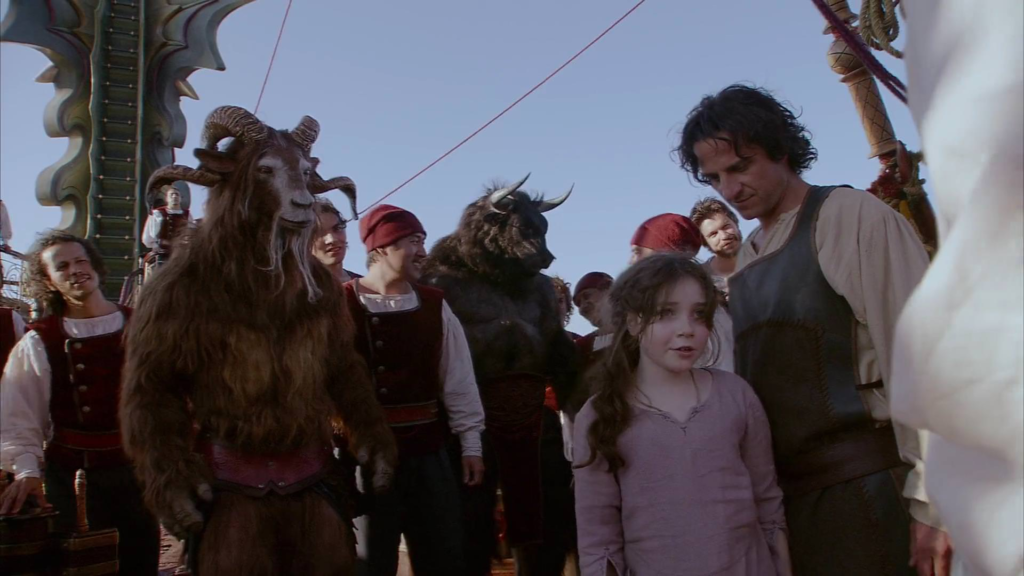
I’m really not sure how MLG was able to stay hidden for so long by the way. Given how much progress Edmund has made cleaning his sword, it seems like the ship has been sailing for at least a few days.
As the crew gets back to work, Reepicheep tells Eustace, “Good match. I’ll make a swordsman of you yet.” Eustace actually smiles, grateful, before scrunching his face into its usual scowl and saying, “Yes, well…if the playing field were a little more even, it would have been an entirely different result.” Reepicheep chuckles as Eustace stalks off. “Indeed.” Throughout the first part of the book, Eustace never expresses anything but contempt for Narnian culture which he regards as disgustingly primitive compared to that of “a civilized country” such as his own. Here, it’s implied he does find Narnia cool deep down but is too proud to admit it. (Remember the impression I mentioned that Eustace’s character in the book gave the writers ideas whereas with every other character except Reepicheep, they had to force ideas?) I like the change. It makes Eustace feel more multidimensional and since the movie moves his most dramatic character development to later than it is in the book, there’s something to be said for starting to humanize him here to compensate.
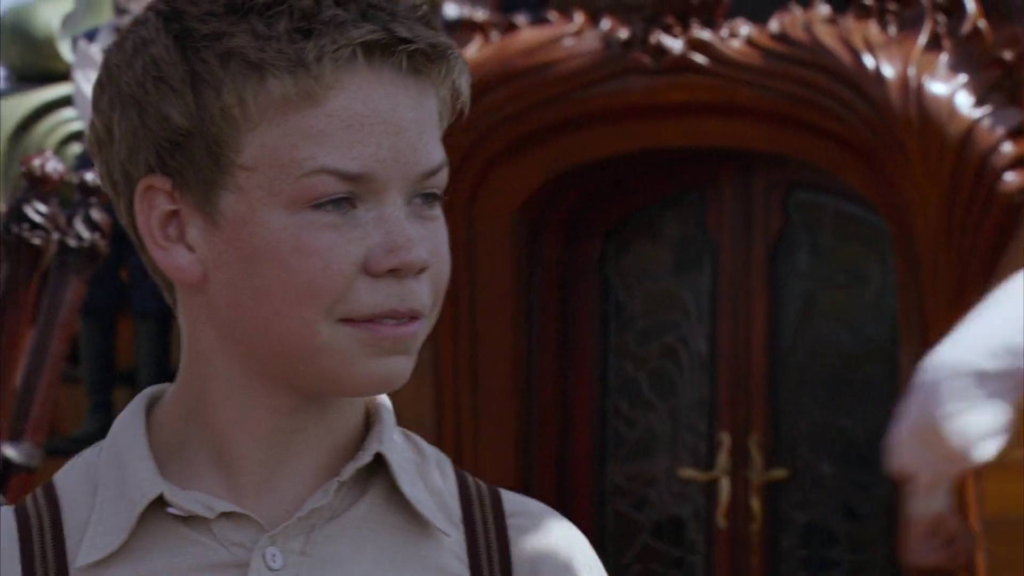
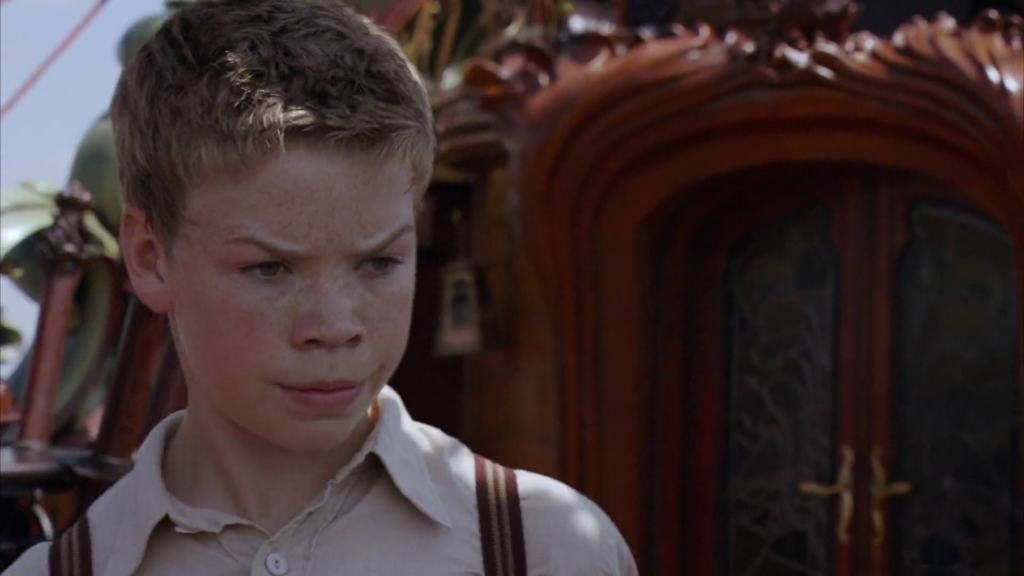
The Dawn Treader arrives at the lush green shores of an island.
Caspian: Looks uninhabited. But if the lords followed the Mist east, they would have stopped here
Drinian: Could be a trap.
Edmund: Or it could hold some answers. Caspian?
Caspian: We’ll spend the night on shore, scour the island in the morning.
When the Dawn Treader reaches an island at this point in the book, Caspian won’t let the crew go on shore after dark for safety reasons, let alone sleep there. Of course, this isn’t the same island as the movie rearranges the order of events somewhat. This messes with the book’s subtle structure, something I didn’t realize it had until I’d read it several times. When the literary Edmund and Lucy first arrive on board, Drinian recaps the voyage so far to them. He mentions a tournament and a pirate attack, either of which could have taken place in a realistic story. Then we get the adventure on the Lone Islands and the storm, both of which are fairly mundane. Except for the magical painting and the talking mouse, there’s not much fantastical about the story. Then on the next island, there’s a dragon and after the crew leaves, they encounter a giant sea serpent. While those are fantastical beasts though, they’re still presented as ordinary animals.[5]Something important does happen on Dragon Island that’s explicitly magical. The experience is kept somewhat distant from readers though. Then we get an island that contains something explicitly magical. Then we get one with even more magic. And the islands just get more and more surreal from there. The movie’s restructuring loses this the-further-east-the-crazier-the-story-gets thing. Still, that’s hardly the worst change.

As everyone slumbers on the beach, giant footprints appear in the sand around them. Voices speak but we can’t see anyone. All we can see is fog coming from invisible mouths. This has the potential to be such a scary scene and it’s frustrating that the movie is too fast paced for it to register that way, especially since the changes it makes to the story make it seem like a goal of the filmmakers was to make it more suspenseful and action packed than the book was. Anyway, one of the voices says, “It seems they’ve brought a pig” in response to Eustace’s snoring. “This one,” says another voice, looking at the sleeping Lucy, “It’s female.” A footprint appears next to MLG. “So’s this one,” says a voice. The pages of a book lying next to Lucy turn. “This one reads!” says the previous voice. Now in the book, only a little girl has the power to free these invisible creatures from their spell, but this is never mentioned in the movie, making their specific interest in “females” kind of odd and even a little creepy. Maybe the idea is they think a girl would be easier to capture.
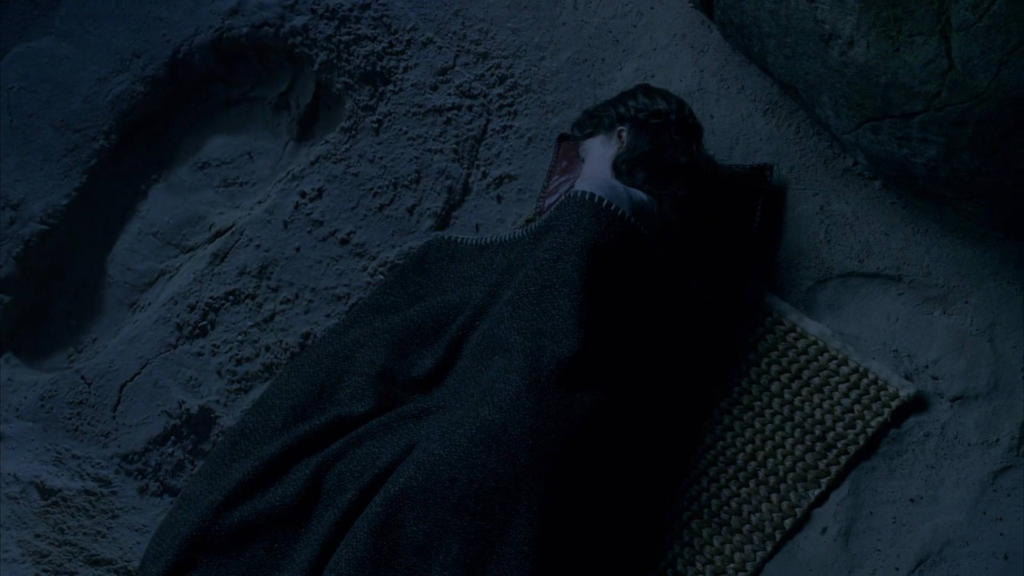
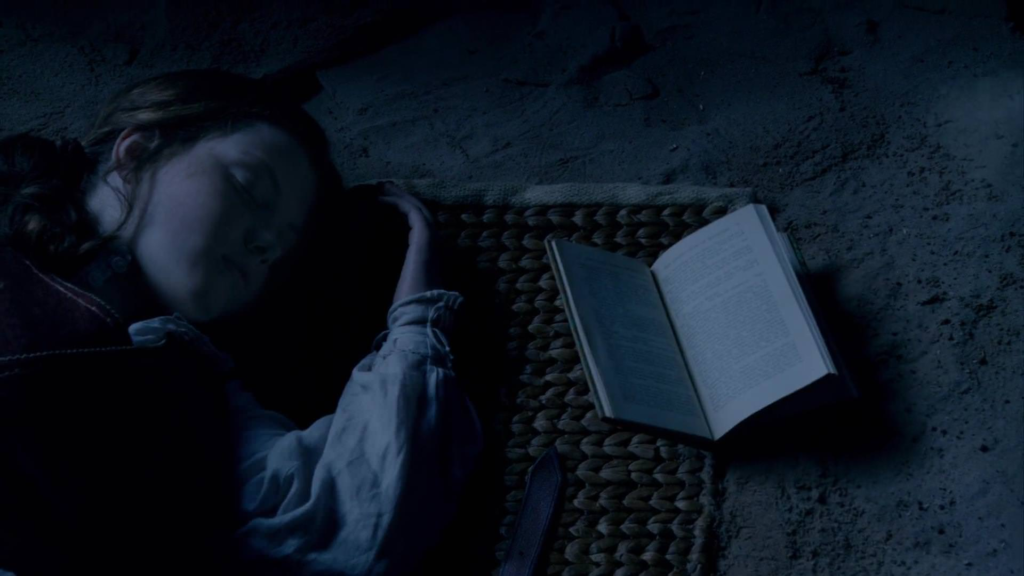
“Let’s take her,” says the voice we heard first. Invisible hands are clamped over Lucy’s mouth, and she’s dragged away through the brush. Since I just criticized the first part of this scene for not being as creepy as it should have been, I’ll praise this part for doing a relatively better job on that score. Lucy is plopped down somewhere in a garden full of fanciful topiary. She draws her sword, but the unseen enemies knock it out of her hand then knock her off her feet.
Voice 1 (Roy Billing): There is no escape.
Voice 2 (Neil G. Young)[6]Trying to match the dialogue to the right actors is kind of a lost cause. This is the best I can do. Sorry for any miscrediting.: Well put!
Voice 3 (Greg Poppleton): Scary.
Voice 4 (Nicholas Neild): Yeah!
Lucy: What are you?
Voice 4: We are terrifying invisible beasts!
Voice 1: If you could see us, you would be really intimidated.
Voice 2: You forgot to mention that we are very large.
Lucy: Well, what do you want?
Voice 1: You. You’ll do what we ask.
Voice 2: She will!
Voice 4: Very clear!
Voice 3: Well put.
Voice 4: Yeah!
Lucy: Or what?
Voice 1: Or death!
Voices (chanting): Death! Death! Death! Death!
Lucy: Well, I wouldn’t be much use to you dead now, would I?
Pause
Voice 1: I hadn’t thought of that.
Voice 2: No, you hadn’t.
Voice 3: Fair point.
That’s pretty funny though I’d maintain these characters were even funnier in the source material. One of the voices tells Lucy if she doesn’t comply, they’ll just kill her friends. She cringes in defeat.
Lucy: What do you want with me?
Voice 1: You will enter the house of the Oppressor.
Lucy: What house?
Voice 1: This one.
An invisible door opens before Lucy, revealing the interior of a house. Actually, this building isn’t so much invisible as it has a cloaking mechanism. If it were really invisible, either we would see all the furniture and everything inside it or when the door opened, Lucy would still see nothing. But enough quibbling.
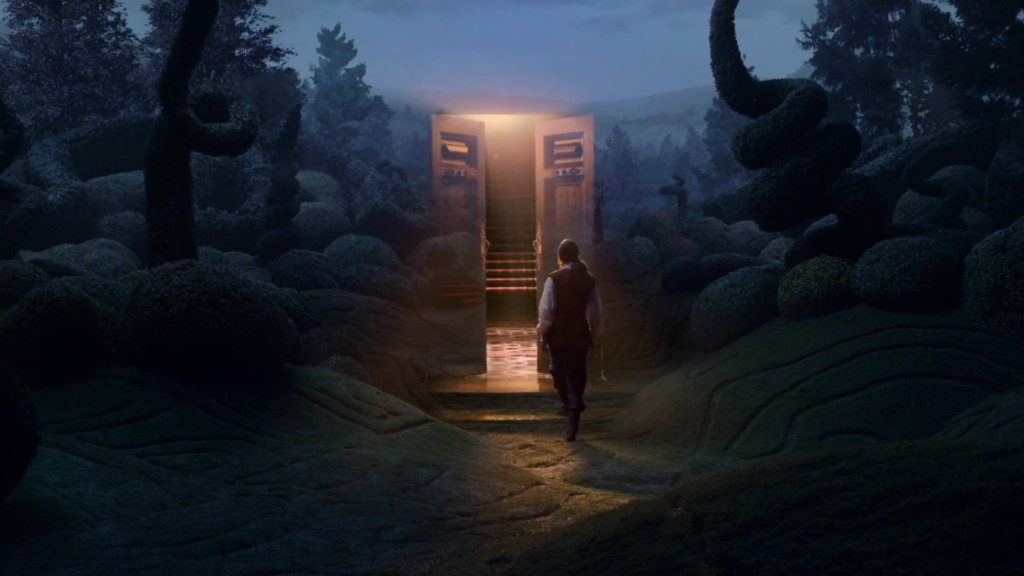
“Upstairs you’ll find the Book of Incantations,” explains the chief voice. “Recite the spell that makes the unseen seen.” Lucy hesitates and the voices, all of them, remind her of what will happen to her friends if she disobeys. “Why don’t you do it yourselves?” Lucy asks suspiciously. “We can’t read,” says the first voice. “Can’t write either as a matter of fact,” says the second. “Or add,” says the third. In a nice touch, the movie implies they didn’t need to threaten Lucy to get her help. as she responds by saying, “Why didn’t you just say so?” The voices warn her to beware the Oppressor (“He’s very oppressive!”) and Lucy steps through the door. It ominously closes behind her. This scenario is slightly different from the book. There, the invisible enemies didn’t kidnap Lucy. They just confronted the Narnians and refused to let them leave alive unless Lucy went upstairs and worked the spell for them to which she agreed. I don’t mind the simplification though. Perhaps it helps the pacing.
Next Week: The Book of Incantations
References
| ↑1 | I’d say a map but they’re supposed to be in uncharted waters. |
|---|---|
| ↑2 | There will be a terrible storm later in the movie, but it won’t have nearly as serious consequences as the book’s storm had. |
| ↑3 | At least he didn’t say “exclamation point.” |
| ↑4 | This is probably because Eustace was the only character with a major arc in the book. I don’t mean that as a criticism by the way. I don’t believe every book needs to be about character development. |
| ↑5 | Something important does happen on Dragon Island that’s explicitly magical. The experience is kept somewhat distant from readers though. |
| ↑6 | Trying to match the dialogue to the right actors is kind of a lost cause. This is the best I can do. Sorry for any miscrediting. |
